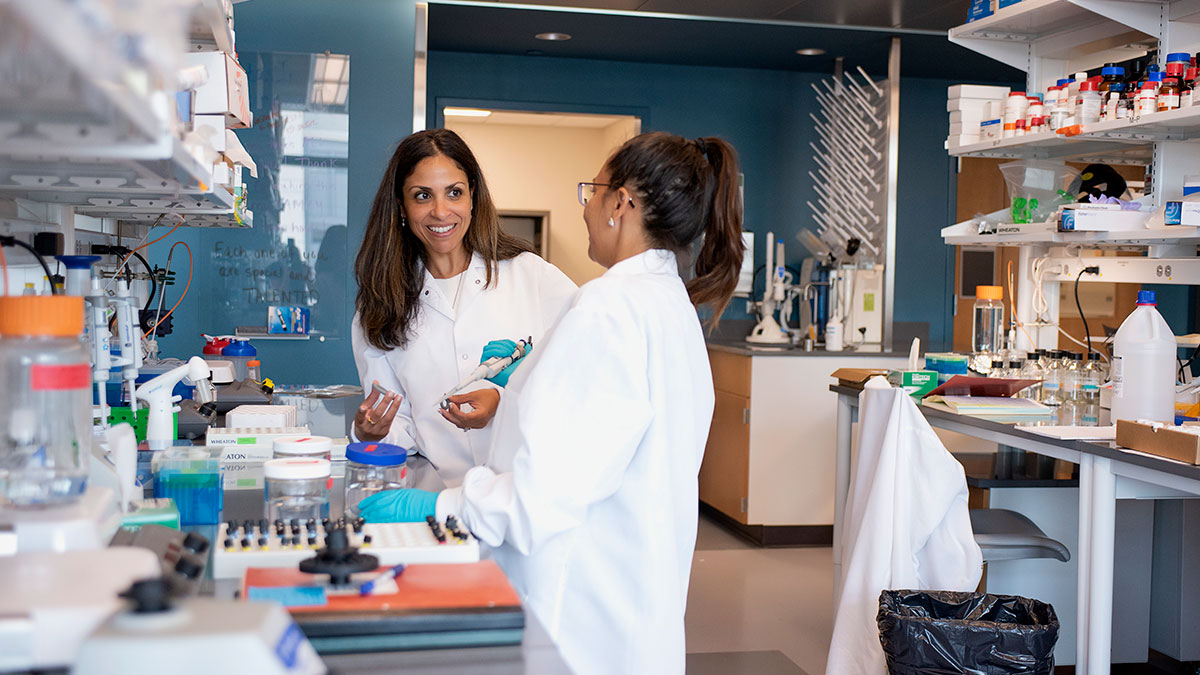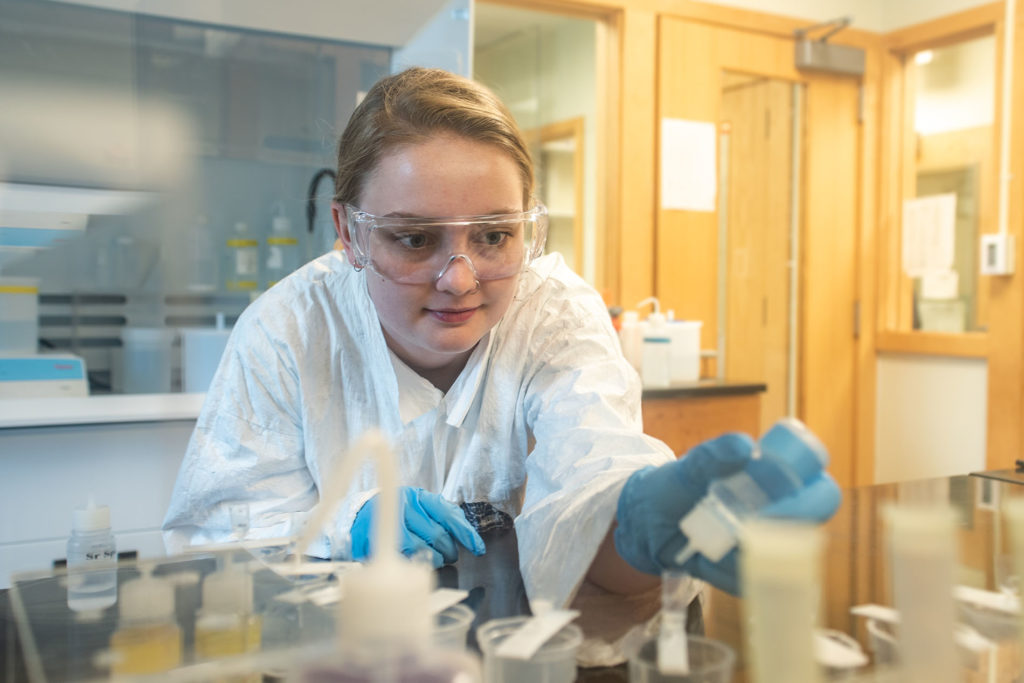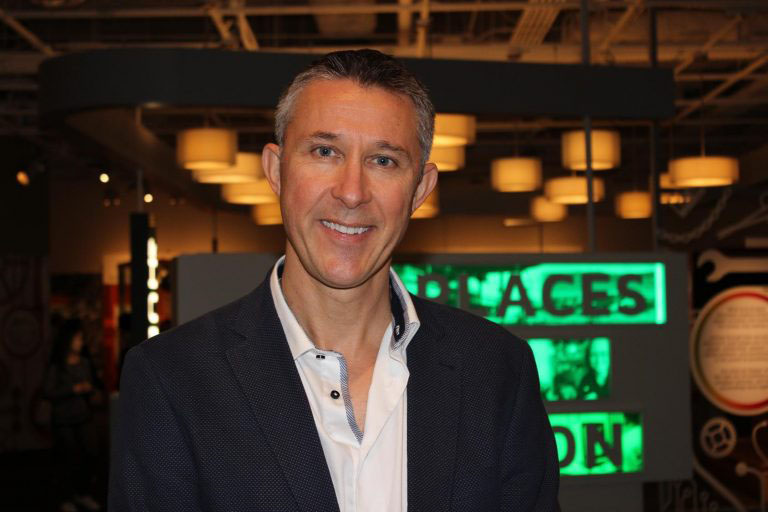On a mission for innovation and translational science, Rahima Benhabbour is using 3D-printing technology and her startup company AnelleO to create a breakthrough in women’s health.

Rahima Benhabbour has always been an advocate for women’s health issues. As an assistant professor in the UNC/NC State Joint Department of Biomedical Engineering and an adjunct professor at the UNC Eshelman School of Pharmacy, her passion is to develop innovative technologies that prevent HIV infections and other health conditions in women.
As fate would have it, watching a TED talk featuring global 3D printing company Carbon was the inspiration she needed to jumpstart her innovative idea. As she watched Carbon CEO and Carolina’s Chancellor’s Eminent Professor of Chemistry Joe DeSimone demonstrate his 3D printer on stage, her mind quickly turned. She began to wonder how she could apply 3D printing technology to intravaginal rings.
“I’m from North Africa. I’m a woman. The thought of helping women – some that don’t have a way of protecting themselves or controlling their lives – that’s my ultimate passion,” she said. “It’s a dream for me to give back.”
As she watched the 3D printer at work, Benhabbour saw how it could quickly print intricate features and asked herself, “What if we could add those intricate features to an IVR, customizing them for drug delivery?”
And with that, AnelleO was born. An advocate for women’s health issues, Benhabbour wanted meaning behind the name for her startup. “Anelleo” means ring in Italian, and Elle is “her” in French. The letter O represents the ring the company makes. All put together, it means “a ring for her.”
Engineering personalized care
Currently, women seeking to use IVRs are given a one-size-fits-all product. By creating an alternative that is not only efficient in drug delivery but can be customized to women and their individual needs, Benhabbour is making more personalized and effective care a reality.
“Unlike traditional technology, 3D printing gives us the ability and engineering to play around with the design and properties of a product. We can engineer parts that would not have been possible before,” she said. “The main goal of developing this 3D technology is to have the ability to change the ways in which women’s products are manufactured and designed. And the applications for the technology are endless – including prevention of HIV, sexually transmitted infections and unintended pregnancies.”
Since launching in 2016, AnelleO continues to grow and work on its first product, AnelleO PRO, a once-a-month progesterone-releasing ring for infertility and assisted reproductive technology. Current products approved for progesterone supplementation are limited to messy and unpleasant vaginal gels or inserts and painful IM injections that have to be administered daily. Designed to safely and steadily release progesterone over an extended duration, AnelleO PRO could potentially replace current therapies and impact more than 1.5 million women.
When working on AnelleO, Benhabbour faced hurdles shared by other Carolina faculty who launch startups, while trying to balance teaching and research responsibilities.
“As a faculty member, this would not have been a dream come true for me without massive support from Carolina,” she said. “I learned how to grow a company and be an academic professor at the same time. The mentality of promoting faculty entrepreneurship is unique to Carolina. It’s really unique.”
A kickstart from campus resources
One resource instrumental in helping Benhabbour get the company started was the KickStart Venture Services Commercialization Award, which is part of Innovate Carolina’s campus-wide effort to translate discoveries made in Carolina’s academic laboratories into products and services that can benefit people in North Carolina and around the world.
“KickStart Venture Services gave us a ‘kickstart.’ You may have an idea but no funding. KickStart helps make connections and gets things moving while serving as an ongoing resource,” she said. “The main hurdle has been to find business leads. KickStart helps faculty launch and carry their startups because we’re too busy in our academic lives to be the lead of a company. We need that support with the business know-how. That support has been tremendous.”
A critical source of funding came from the Eshelman Institute for Innovationat the Eshelman School of Pharmacy. The institute provided a $200,000 grant titled “Fabrication of Geometrically Complex Intravaginal Rings by Continuous Liquid Interface Production 3D Printing Technology” that helped Benhabbour initially create the technology. Such financial backing, along with the additional entrepreneurial support from the Eshelman Institute for Innovation in partnership with KickStart and the broader Innovate Carolina team, bolstered Benhabbour’s early efforts to bring her concept to life.
The Office of Technology Commercialization team – also part of the Innovate Carolina initiative – assisted with guidance on patents and licensing, while helping Benhabbour navigate conflicts of interest. Benhabbour also participated in the Faculty Entrepreneurship Workshop, an annual, invite-only event for UNC-Chapel Hill faculty hosted by Innovate Carolina. Nominated by deans, workshop participants are invited based on the promise they show toward entrepreneurial thinking.
“As scientists, we like to have the ability to think and get our brains to the point of thinking through new things. Because of the workshop, I’m now implementing design thinking in my lab,” she said. “I used to have a journal club meeting with my lab, selecting two people to pick a news article or journal publication. They present those along with what the labs did well and what they could have done better. After the workshop, we now focus on design thinking. We ideate on new ideas and new technologies.”
For Benhabbour, it’s gratifying to see the many female student scientists who work in her lab contribute to solving the health issues of other women while applying the design thinking principles she brought back from the workshop.
Innovation through collaboration
In growing AnelleO, Benhabbour is also thankful for the many opportunities presented for collaboration with different schools and departments across campus.
“None of the ongoing projects I have in my lab are in a silo. Everything is collaborative,” she said. “One of the most attractive things about Carolina is to have world-class experts in the field to collaborate with. The sky is the limit. Go and innovate. Go and see how far you can get. Taking advantage of the expertise around me is what helped launch AnelleO, allowing for the creation of a product that could make a difference in the future.”
As Benhabbour continues to make strides as an entrepreneur, she is embracing the innovation journey and gaining valuable insights along the way.
“For faculty looking to spin off a company, always start by speaking with other faculty who have gone through the process. Knowing what to expect prepares you for doing it right,” she said. “Can you do it or not? Is it something you want to do? Is this the right time in your career and personal life? It takes time and effort, and it depends on your stamina and passion.”
For faculty members hesitant to pursue that big idea, Benhabbour admits it can be hard but offers encouraging advice.
“It’s hard for an academic – you always have questions. What I’ve learned is that if you have an idea, put it out there and talk to multiple people. Don’t stop with yourself and question your idea,” she said. “Get it out there, and see what the potential is for your idea as opposed to looking at the hurdles. Instead of looking at how something won’t work, just think of what it can be.”
By Innovate Carolina




